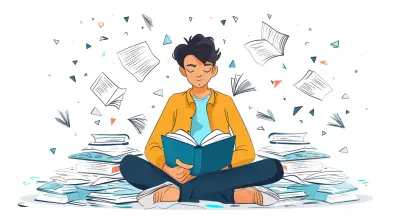The Link Between Anxiety and Learning Disabilities: What You Should Know
24 May 2025
If you’ve ever experienced anxiety, you know how it can turn your world upside down. The racing thoughts, the tight chest, the overwhelming sense of doom—it’s no walk in the park. Now, imagine dealing with these feelings on top of having a learning disability. Sounds tough, right? Well, that’s because it is.
There’s a significant link between anxiety and learning disabilities that many people aren’t aware of. This connection can create a vicious cycle where one exacerbates the other, making everyday life much more challenging for those affected. In this article, we’ll dive deep into this relationship, explore why it happens, and discuss what can be done to alleviate some of the struggles.
So, grab a cup of coffee, get comfy, and let’s unravel the complexities behind anxiety and learning disabilities.

What Are Learning Disabilities?
Before we get into the nitty-gritty of anxiety, let’s first define what we mean by a learning disability. It’s not just about struggling with schoolwork or having difficulty with a particular subject. A learning disability is a neurological disorder that affects the brain's ability to receive, process, store, and respond to information.People with learning disabilities may have problems with:
- Reading (dyslexia)
- Writing (dysgraphia)
- Math (dyscalculia)
- Understanding spoken language
- Organizing information
It’s not that they aren’t smart—in fact, many people with learning disabilities have average or above-average intelligence. However, their brains process information differently, which can make learning certain things more difficult.
Now, throw anxiety into the mix, and it’s like adding fuel to the fire.

Understanding Anxiety
We all feel anxious from time to time. It’s a natural response to stress, and in small doses, it can even be helpful—like when you’re preparing for a big exam or giving a presentation. But when anxiety becomes chronic, it can interfere with daily life, causing physical symptoms like:- Racing heart
- Sweating
- Shaking
- Shortness of breath
- Difficulty concentrating
For people with learning disabilities, anxiety can become a constant companion. The pressure to keep up with peers, the frustration of not understanding something, and the fear of being judged can all contribute to a heightened state of anxiety.

The Connection Between Learning Disabilities and Anxiety
So, why is there such a strong link between learning disabilities and anxiety? It all comes down to the complex interaction between cognitive challenges and emotional stress.1. Struggles with Self-Esteem
One of the biggest reasons that people with learning disabilities experience anxiety is because of low self-esteem. Imagine being in a classroom where everyone seems to understand the lesson, but you’re struggling to keep up. You might start to doubt your abilities and feel like you’re not as smart as your peers.Over time, these feelings can lead to:
- Social anxiety: Fear of being judged or ridiculed by classmates or teachers.
- Performance anxiety: Worrying excessively about schoolwork, tests, or being called on in class.
2. Fear of Failure
For individuals with learning disabilities, the fear of failure can be paralyzing. They may have experienced failure in the past, and as a result, they begin to anticipate it in the future. This can cause them to feel anxious even before they start a task, leading to avoidance behaviors.- They might put off starting assignments.
- They might avoid participating in class discussions.
- They might even develop a full-blown phobia of school.
This cycle of fear and avoidance only reinforces their anxiety, making it even harder to succeed.
3. Overwhelm from Sensory Input
Many people with learning disabilities also have sensory processing issues, meaning they can become easily overwhelmed by loud noises, bright lights, or even the feeling of certain textures. When their environment becomes too overwhelming, it can trigger anxiety.Think of it like trying to concentrate on a complicated math problem while someone is blasting music in your ear. It’s nearly impossible to focus, right? That’s how many individuals with learning disabilities feel—constantly bombarded by stimuli that make it hard to concentrate, which in turn ramps up their anxiety levels.

How Anxiety Affects Learning
Anxiety doesn’t just make someone feel bad—it can actually interfere with their ability to learn. Let’s take a look at how.1. Difficulty Concentrating
When you’re anxious, your brain goes into “fight or flight” mode. This is an evolutionary response designed to protect us from danger, but it’s not so helpful when you’re trying to focus on schoolwork. Instead of concentrating on the task at hand, your brain is busy worrying about potential threats.For people with learning disabilities, this can make it even harder to absorb information, as their brain is already working overtime to process things differently. Imagine trying to read a book while your mind is constantly racing with “what if” scenarios. It’s exhausting!
2. Memory Problems
Another way anxiety affects learning is by impairing working memory. This is the part of your brain responsible for holding onto information while you use it—like remembering a math formula while you’re solving a problem.When someone is anxious, their working memory becomes overloaded with worries, making it harder for them to retain new information. This is especially problematic for people with learning disabilities, who may already have trouble with memory and recall.
3. Avoiding Challenges
People with anxiety often avoid situations that make them feel anxious. For someone with a learning disability, this might mean avoiding tasks they find difficult, like reading out loud or doing math in front of others. While avoidance might reduce anxiety in the short term, it ultimately reinforces the fear and prevents them from developing the skills they need to succeed.Breaking the Cycle: What Can Be Done?
Now that we’ve established the link between anxiety and learning disabilities, the big question is: What can be done about it? The good news is that there are several strategies that can help break the cycle of anxiety and learning difficulties.1. Early Intervention
The sooner a learning disability is identified, the better. Early intervention can help prevent anxiety from developing in the first place. Schools can provide Individualized Education Plans (IEPs) or 504 Plans, which offer accommodations like extended time on tests, quiet environments for learning, and alternative ways of demonstrating knowledge.2. Cognitive Behavioral Therapy (CBT)
Cognitive Behavioral Therapy (CBT) is one of the most effective treatments for anxiety. It helps individuals identify negative thought patterns and replace them with more realistic, positive ones. For example, a student with performance anxiety might learn to reframe their fear of failure as an opportunity to learn and grow.CBT can also teach coping strategies like deep breathing, mindfulness, and visualization techniques to manage anxiety in the moment.
3. Building Self-Esteem
Boosting self-esteem is crucial for individuals with learning disabilities. One way to do this is by focusing on their strengths, not just their weaknesses. Everyone has something they excel at, whether it’s art, music, sports, or problem-solving. Encouraging these talents can help build confidence and reduce anxiety.4. Supportive Environment
Creating a supportive environment both at school and at home is essential. Teachers, parents, and peers can provide encouragement, patience, and understanding. Schools should focus on fostering a growth mindset, emphasizing that intelligence isn’t fixed and that everyone can improve with effort and persistence.5. Medication
In some cases, medication may be necessary to manage severe anxiety. Anti-anxiety medications or antidepressants can help regulate brain chemistry, making it easier for individuals to cope with their symptoms. However, this should always be done under the supervision of a medical professional.
Final Thoughts
The relationship between anxiety and learning disabilities is complex, but it’s not insurmountable. With the right support, early intervention, and coping strategies, individuals with learning disabilities can learn to manage their anxiety and succeed both in school and in life.If you or someone you know is struggling with both anxiety and a learning disability, remember that you’re not alone. There are resources, professionals, and strategies out there to help you navigate these challenges.
So, take a deep breath, stay positive, and keep moving forward. You’ve got this!
all images in this post were generated using AI tools
Category:
Learning DisabilitiesAuthor:

Bethany Hudson
Discussion
rate this article
3 comments
Gabriel Hardy
Understanding the anxiety-learning disabilities connection is crucial for effective educational support strategies.
June 7, 2025 at 12:40 PM

Bethany Hudson
Thank you for your insight! Understanding this connection indeed enhances our ability to provide tailored support for students facing these challenges.
Brooks Cole
Thank you for shedding light on the important connection between anxiety and learning disabilities. Your insights are invaluable for educators and parents alike, helping to foster understanding and support for those who face these challenges in their learning journeys.
May 25, 2025 at 3:12 AM

Bethany Hudson
Thank you for your kind words! I'm glad you found the insights helpful in supporting understanding for educators and parents.
Azriel Wright
Great insights! Grateful for the awareness you bring.
May 24, 2025 at 3:01 AM

Bethany Hudson
Thank you! I'm glad you found the insights valuable. Your support means a lot!



